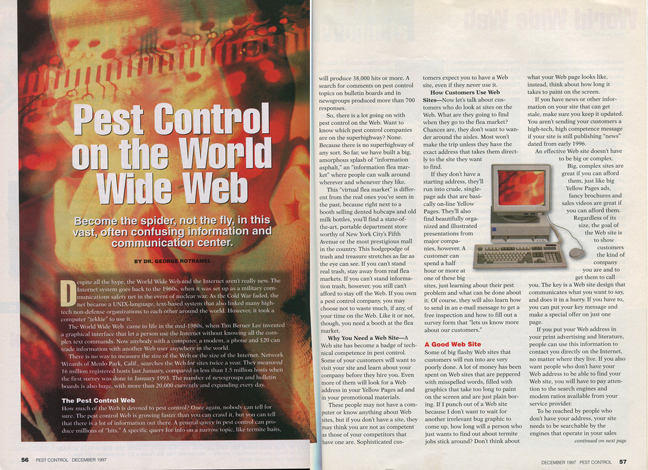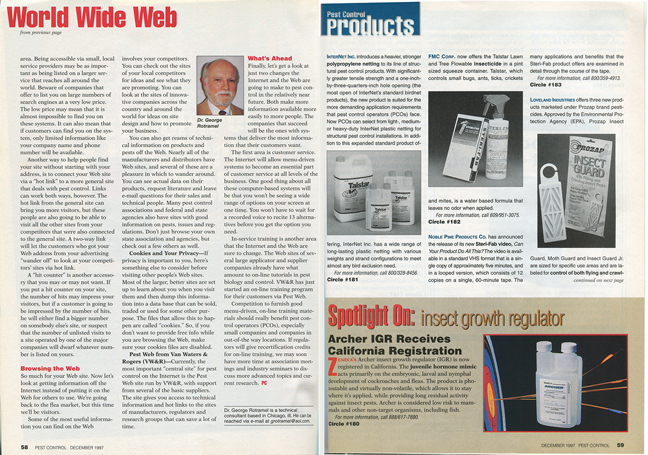- Photo: PMP archives
- Photo: PMP archives
The December 1997 issue of then-Pest Control magazine was the first to include our very first email address, pestcontrol@en.com. We were still several months away from our first website, PestControlMag.com. I was on staff then, and as an idealistic 20-something, I remember conversations with then-Editor-in-Chief and Publisher Jerry Mix about us using an email address and website. My babbling back then to the PMP Hall of Famer and current PMP editor at-large may have been just like how a younger employee is bugging you these days about getting an Instagram account, or doing more with your company’s brand on YouTube. It may start off as something you nod about and say, “We should look into it,” while thinking “When on earth would I have the time, money and resources to get that done?” (Yep, that overwhelming feeling is not unique to today’s workplace.)
But just like the advent of the radio, TV, email and websites before it, social media is a crucial part of today’s business marketing efforts. It may be no coincidence — full disclosure, I don’t remember — that in the same issue where our email address magically appeared in our masthead for the first time, we published an article by industry consultant Dr. George Rotramel titled, “Pest Control on the World Wide Web.” You can read the article in its entirety or download a PDF of the 1997 article here. But what follows are some particularly prescient snippets from Dr. Rotramel’s article:
How much of the Web is devoted to pest control? Once again, nobody can tell for sure. The pest control Web is growing faster than you can crawl it, but you can tell that there is a lot of information out there. A general query in pest control can produce millions of “hits.” A specific query for info on a narrow topic, like termite baits, will produce 38,000 hits or more… (Editor’s Note: For comparison, in mid-May 2018, a Google search of termite baits returned approximately 105,000 results; however, putting it in quotation marks brought that number down to 25,300.)
Want to know which pest control companies are on the superhighway? None. Because there is no superhighway of any sort. So far, we have built a big, amorphous splash of “information asphalt,” an “information flea market” where people can walk around wherever and whenever they like. This virtual flea market is different from real ones you’ve seen in the past, because right next to a booth selling dented hubcaps and old milk bottles, you’ll find a state-of-the-art, portable department store worthy of New York City’s Fifth Avenue or the most prestigious mall in the country… Like it or not, though, you need a booth at the flea market…
A Web site has become a badge of technical competence in pest control. Some of your customers will want to visit your site and learn about your company before they hire you. Even more of them will look for a Web address in your Yellow Pages ad and in your promotional materials. These people may not have a computer or know anything about Web sites, but if you don’t have a site, they may think you are not as competent as [competitors with Web sites are]…
Finally, let’s get a look at just two changes the Internet and the Web are going to make to pest control in the relatively near future. Both make more information available more easily to more people…
The first area is customer service. The Internet will allow menu-driven systems to become an essential part of customer service at all levels of the business. One good thing about all those computer-based systems will be that you won’t be seeing a wide range of options on your screen at one time. You won’t have to wait for a recorded voice to recite 13 alternatives before you get the option you need.
In-service training is another area that the Internet and the Web are sure to change. The Web sites of several large applicator and supplier companies already have what amount to on-line tutorials in biology and control… If regulators will give recertification credits for on-line training, we may soon have more time at association meetings and industry seminars to discuss more advanced topics and current research.


Leave A Comment